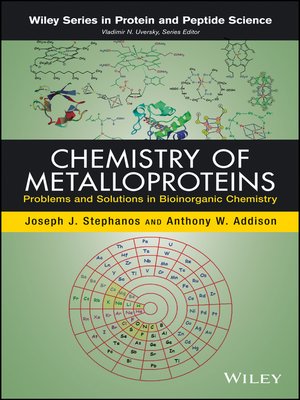Chemistry of Metalloproteins
ebook ∣ Problems and Solutions in Bioinorganic Chemistry · Wiley in Protein and Peptide Science
By Joseph J. Stephanos

Sign up to save your library
With an OverDrive account, you can save your favorite libraries for at-a-glance information about availability. Find out more about OverDrive accounts.
Find this title in Libby, the library reading app by OverDrive.



Search for a digital library with this title
Title found at these libraries:
| Library Name | Distance |
|---|---|
| Loading... |
Addresses the full gamut of questions in metalloprotein science
Formatted as a question-and-answer guide, this book examines all major families of metal binding proteins, presenting our most current understanding of their structural, physicochemical, and functional properties. Moreover, it introduces new and emerging medical applications of metalloproteins. Readers will discover both the underlying chemistry and biology of this important area of research in bioinorganic chemistry.
Chemistry of Metalloproteins features a building block approach that enables readers to master the basics and then advance to more sophisticated topics. The book begins with a general introduction to bioinorganic chemistry and metalloproteins. Next, it covers:
Chapters are richly illustrated to help readers fully grasp all the chemical concepts that govern the biological action of metalloproteins. In addition, each chapter ends with a list of suggested original research articles and reviews for further investigation of individual topics.
Presenting our most current understanding of metalloproteins, Chemistry of Metalloproteins is recommended for students and researchers in coordination chemistry, biology, and medicine.
Each volume of the Wiley Series in Protein and Peptide Science addresses a specific facet of the field, reviewing the latest findings and presenting a broad range of perspectives. The volumes in this series constitute essential reading for biochemists, biophysicists, molecular biologists, geneticists, cell biologists, and physiologists as well as researchers in drug design and development, proteomics, and molecular medicine with an interest in proteins and peptides.







